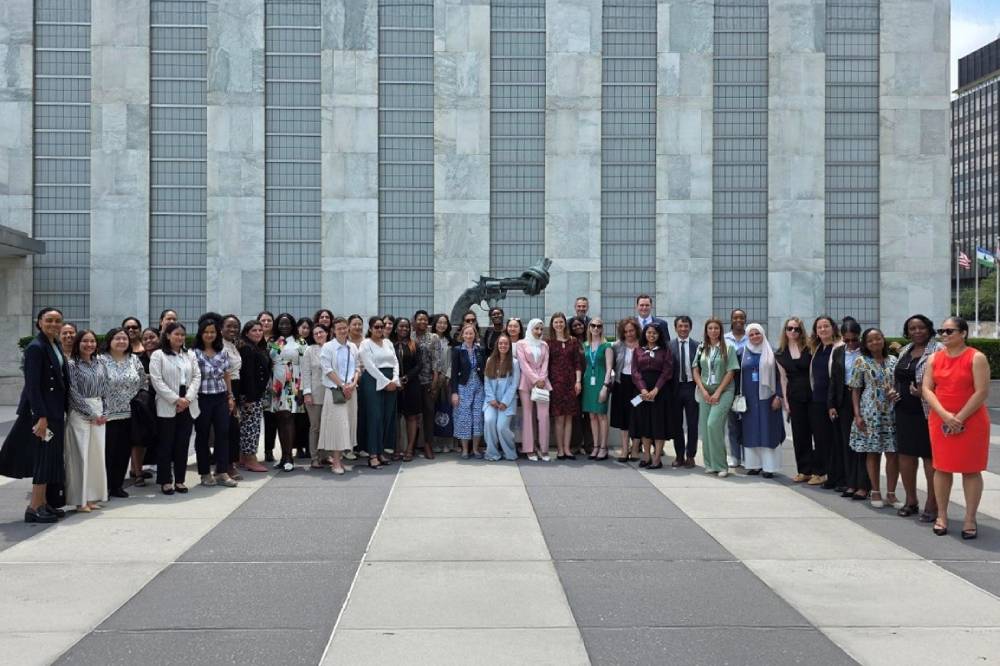As part of the Women in International Security and Cyberspace (WiC) Fellowship, UNIDIR delivered four days of comprehensive training in New York to 40 women diplomats from 34 Member States.
The WiC Fellowship is a capacity-building initiative and institutional support programme, designed to strengthen the knowledge and skills of a group of women delegates and leaders on international cybersecurity from all regions, and support their full and meaningful participation in the Open-Ended Working Group (OEWG) on ICT security sessions.
From 30 June to 3 July, the training delivered by UNIDIR in partnership with the Global Forum on Cyber Expertise (GFCE) and the Australian Department of Foreign Affairs and Trade, empowered WiC fellows to meaningfully contribute to discussions in the final session of the OEWG – which was held from 7 to 11 July.
Tangible progress in women’s participation
The fellowship has steadily advanced gender inclusivity in global cyber diplomacy and built a community of global expertise. It has become a space where women in international ICT security can come together across countries, disciplines and backgrounds to grow, connect and lead.

In just a few years, there has been remarkable progress in women’s participation and leadership in multilateral discussions on ICT security – and the impact is measurable. As shared by the Australian delegation in the 11th session of the OEWG, women delivered 54% of all substantive interventions,a significant increase from the 37% in 2021. Initiatives such as the WiC Fellowship have played an important role in achieving this tangible progress.
The training took place at a pivotal moment for cybersecurity diplomacy, ahead of the concluding session of the OEWG and as States sought to agree on the parameters of the future UN permanent mechanism on ICT security. Accordingly, the programme wasdesigned to address all pillars of the UN Framework for Responsible State Behaviour in Cyberspace, the expected outcomes of the multilateral discussions, as well as forward-looking discussions on the future UN permanent mechanism. Throughout the week, the sessions featured numerous experts, government representatives, UN officials and representatives of regional organizations to share their experience and expertise.
Building skills and networks
The programme encompassed sessions led by UNIDIR and other internationally renowned experts tobuild in-depth knowledge in key areas such as:
- The evolution of the UN Framework
- The 11 norms of responsible State behaviour in cyberspace
- International law
- Confidence building measures
- National and regional perspectives on cybersecurity
- The future of UN negotiations on ICT security
The training also included practical activities combined with skills-building exercises on mentoring, public speaking, multilateral negotiations and technical skills.
WiC fellows had the opportunity to meet with high-level officials, notably the UN Under-Secretary-General and High Representative for Disarmament Affairs, Izumi Nakamitsu, and the OEWG Chair, H.E. Ambassador Burhan Gafoor, to reflect on the current and future negotiations on international ICT security. Other prominent speakers included the Permanent Representatives of New Zealand, Germany and Costa Rica, who shared their insights and experiences on women leadership in diplomacy.
Finally, the fellows also benefited from networking activities and study visits, including a stop at Microsoft’s UN Offices, where they learnt about the evolving cyber threat landscape.

UNIDIR’s role and global support
UNIDIR is proud to have joined this edition of the WiC training programme as co-organizer and content partner, where we leveraged our research expertise and neutral and inclusive approach to contribute to the design and delivery of the fellowship training.
Coordinated by the GFCE, this cohort of WiC fellows were generously sponsored by the Governments of Australia, Canada, Germany, the Netherlands, New Zealand, and the United Kingdom, and the European Union Institute for Security Studies.
